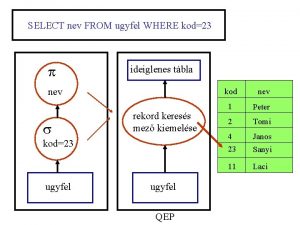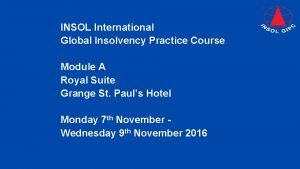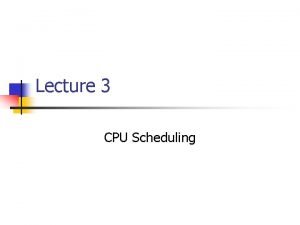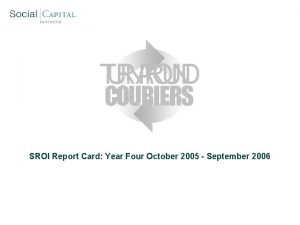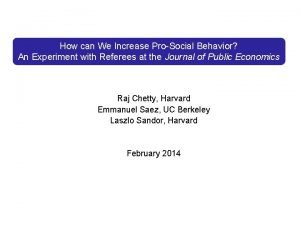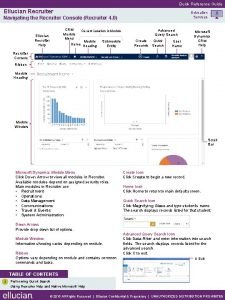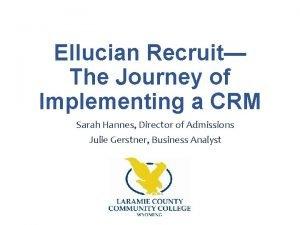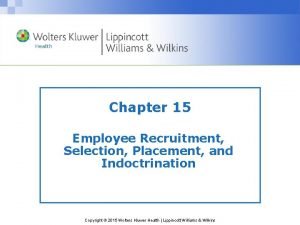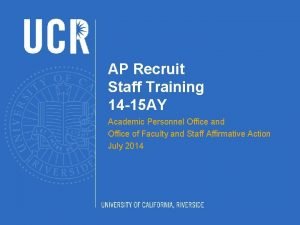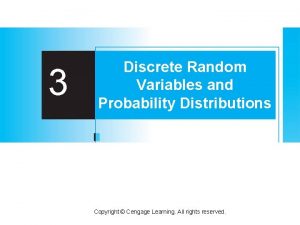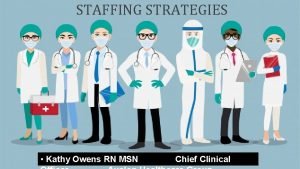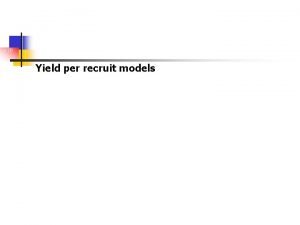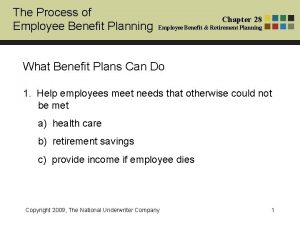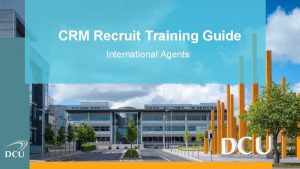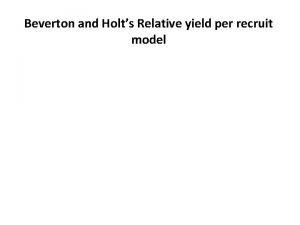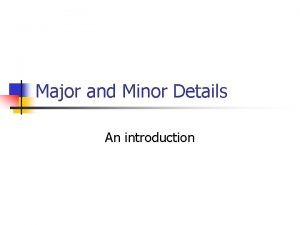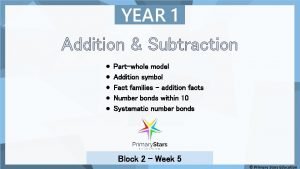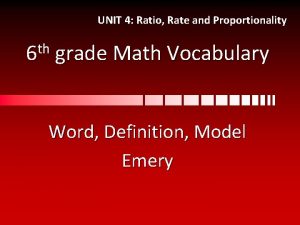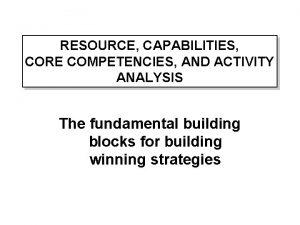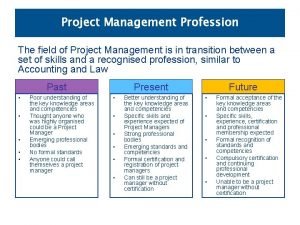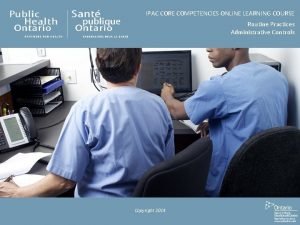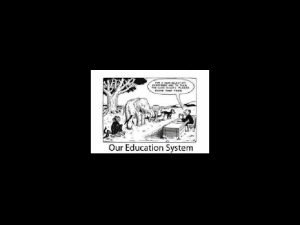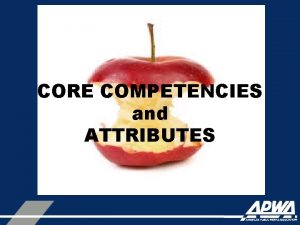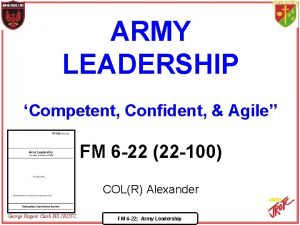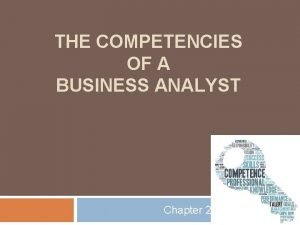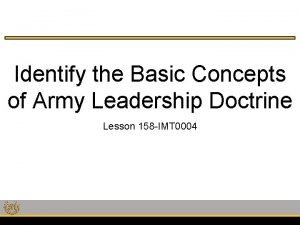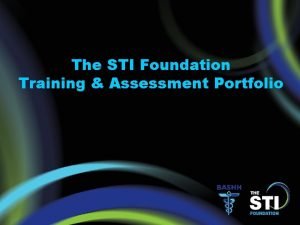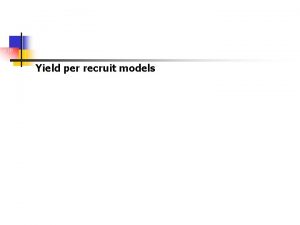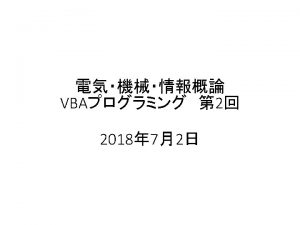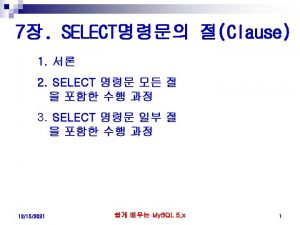Recruit Select and Support Turnaround Leader Competencies Part




















































- Slides: 52

Recruit, Select, and Support: Turnaround Leader Competencies Part 3: Developing and Supporting Turnaround Leaders Copyright © 20 XX American Institutes for Research. All rights reserved.

Introductions and Overview 2

Using Turnaround Leader Competencies Professional Learning Module Recruit, Select, and Support: Turnaround Leader Competencies Part 1: Understanding Turnaround Leader Competencies Part 2: Recruiting and Selecting Turnaround Leaders Part 3: Developing and Supporting Turnaround Leaders 3

Partner Organizations 4

Introductions § Your name § Your role § Characteristic of a high-quality professional development session you have experienced 5

Part 3: Outcomes § Understand the district’s role in developing and supporting turnaround leaders. § Examine high-quality adult learning and implications for competency-based development of turnaround principals. § Explore how districts can leverage principal supervisors and others to increase turnaround principal competencies. 6

Part 3: Agenda § Introductions and Overview § Turnaround Leader Competencies § Context: Systems of Support § District Support and Accountability § Turnaround Leader Professional Development § Role of Principal Supervisor § Competency-Based Development in Action § Closing Reflections 7

Turnaround Leader Competencies 8

Competencies Review § Competencies are underlying motives and habits—or patterns of thinking, feeling, acting, and speaking—that cause a person to be successful in a specific job or role. § Competencies lead to actions that lead to outcomes. § Competencies explain some of the differences in performance levels of leaders. § Competencies can be measured and intentionally developed. (Spencer & Spencer, 1993; Steiner & Hassel, 2011) 9

Turnaround Leader Competencies • Achievement / Focus on Sustainable Results • Monitoring & Directiveness / Holding People Accountable • Initiative & Persistence • Planning Ahead • Self-Confidence / Commitment to Student Learning • Belief in Learning Potential • Impact and Influence • Team Leadership / Engaging the Team Driving for Results Influencing for Results Personal Effectiveness Problem Solving • Developing Others • Analytical Thinking • Conceptual Thinking (Public Impact, 2008; Spencer & Spencer, 1993; Zhu, Hitt, & Woodruff, 2015) 10

Turnaround Schools Systems of Support 11

“Every system is perfectly designed to get the results it gets. ” —Quotation from Paul Batalden, M. D. 12

School Turnaround Context Community Commitment to Change Leader Selection Autonomy Turnaround School Teacher Selection Leader Development District Community Engagement Leader Accountability 13

How Districts Support Turnaround 1. Commit to success. 2. Choose turnarounds for the right schools. 3. Develop a pipeline of turnaround leaders. 4. Give leaders the “Big Yes” (autonomy). 5. Hold leaders accountable for results, and support them to meet expectations. 6. Prioritize teacher hiring in turnaround schools. 7. Proactively engage the community. (Kowal, Hassel, & Hassel, 2009) 14

How Districts Support Turnaround § Using the self-assessment tool individually or in teams, reflect on how your district or the districts you serve currently support turnaround. § Discuss the implications of your current state. • How are supports different for turnaround and non-turnaround schools? • How are supports different for district-run/charter, urban/rural schools? • What are the barriers to district support for turnaround schools? § Share two ideas from your discussion with the whole group. 15

District Support and Accountability 16

Principle of Reciprocity Accountability must be a reciprocal process. For every increment of performance I demand from you, I have an equal responsibility to provide you with the capacity to meet that expectation. Likewise, for every investment you make in my skill and knowledge, I have a reciprocal responsibility to demonstrate some new increment in performance. This is the principle of reciprocity of accountability for capacity. It is the glue that, in the final analysis, will hold accountability systems together. (Elmore, 2002) 17

Support and Accountability: An Unbeatable Match ACCOUNTABILITY Effective Turnaround Leader SUPPORT (Hitt, 2015; Hitt & Tucker, 2015) 18

Activity: Support and Accountability Individually: 1. Describe how you define “supporting” someone. Include two synonyms for support. 2. Describe how you define “holding someone accountable. ” Include two synonyms for accountability. 19

Supporting + Holding Accountable Supporting Monitoring/measuring Generating insight Teaching new concepts/skills Coaching and mentoring Reflecting on practice Setting goals Observing Assessing formatively Providing feedback Your ideas! Holding Accountable Monitoring/measuring Reminding Calling attention to Checking on Pointing out Expecting Redirecting Assessing summatively Evaluating Your ideas! 20

Activity: Support and Accountability With your team: 3. Identify differences between supporting turnaround leaders and school leaders in non-turnaround schools. 4. Be prepared to share with the whole group. 21

Turnaround Leader Professional Development 22

Development for Turnaround Principals Review the Turnaround Leader Competencies Turn and Talk: § How might these competencies be developed? § How could the district be supportive and hold turnaround principals accountable? 23

Competency-Based Support and Accountability § Supportive Professional Development: Provide highquality professional development that comprises a coherent set of experiences intended for turnaround principals to cultivate the competencies and actions necessary for turnaround success. § Generative Accountability Structures: Evaluate on the basis of, expect use of, and provide feedback and focus on the competencies and actions that matter for turnaround. (Hitt, 2015) 24

High-Quality Professional Development: What is your experience? 1. Write two or three sentences about what made this example “high quality. ” 2. Write two or three sentences about how it changed your practice or perspective about your job, OR how you think it did so for your audience. 3. Turn and share with a partner next to you. 4. Create a list that synthesizes what each of you said. 5. Make notes to be to shared with the group. 25

High-Quality School Leader Development: What does the research say? § Content focused on improved instruction and school change § Differentiated to address varied leader needs § Collegial networks and protocols for collaboration § Job-embedded instruction and applications of learning § Long-term delivery with multiple learning opportunities § Sharing from experts or experienced practitioners § Mentoring and coaching to fit individual and school needs (Drago-Severson, Asghar, Blum-De. Stefano, & Welch, 2011; Goldring, Preston, & Huff, 2012; and Mitgang, 2012) 26

Activity: Competency-Based Leadership Development Developing Turnaround Leader Competencies Individually or as a team: § Reflect on your current practices in turnaround leader development. § Identify changes you would make to better meet the development needs of turnaround leaders. 27

Role of Principal Supervisors 28

Role of Principal Supervisor The primary roles of the principal supervisor are: § Professional development and coaching § Evaluation and feedback § Liaison between school and district § Buffering and barrier removal The role of principal supervisors becomes more important when we consider the potential they have to bolster efforts of turnaround principals through individualization. 29

Implications for Turnaround Principals Principal supervisors should: § Have a limited number of turnaround principals. § Have weekly interactions with each turnaround principal. § Develop and participate in evaluation of their turnaround principals. § Be thoughtfully matched with turnaround principals. (Corcoran et al. , 2013) 30

How do districts, via principal supervisors, develop turnaround principals? 1. Diagnosing competency levels 2. Setting leader development goals 3. Facilitating leader development 4. Frequently observing and providing feedback 5. Monitoring and adjusting development plans 31

1. Diagnosing Competency Levels The principal supervisor and turnaround principal review evaluations of turnaround principal competencies and identify strengths and areas for improvement. § Conduct behavior event interview (BEI), or use BEI results from selection process, to identify competencies. § Conduct self-evaluations that elicit the principal’s perception of his or her own competencies. § Conduct 360 evaluations that solicit feedback from others on perceptions of principal competencies. § Document and assess competencies through school review site visit interviews, focus groups, and observations. 32

2. Setting Leader Development Goals Using data, the principal supervisor and turnaround principal work together to pinpoint the highest leverage competencies to identify: § Strengths and set goals to leverage strengths. § Competencies that are partially developed but could be quick wins, if developed further. § Stretch goals in areas that are relative weaknesses but could increase leader effectiveness. 33

3. Facilitating Leader Development Based on the individualized goals and development plans, principal supervisors and turnaround principals identify aligned development experiences such as: § Relevant reading and training opportunities § Visits to successful schools § Peer-to-peer learning opportunities § Coaching and mentoring § Leadership rounds 34

4. Observing and Providing Feedback Principal supervisors frequently observe turnaround principals and provide feedback on leader actions. § Schedule frequent observation and feedback meetings. § Conduct observations of leader actions in a variety of settings: leadership team, teacher teams, faculty meetings, teacher observations and feedback, professional development, etc. § Provide feedback aligned to the turnaround principal leader development goals and action plans. 35

5. Monitoring and Adjusting Development Plans The turnaround principal, with feedback from the principal supervisor, monitors progress and identifies actions they will take to reach development goals. § Identify leader actions, timeline, and expected impact. § Frequently review status of actions and impact. § Determine next actions, timeline, and expected impact. § Repeat, in a cycle of continuous improvement. 36

Activity: Triad Conversation What is one thing principal supervisors in your district could do that would have the greatest impact on increasing the effectiveness of turnaround principals? 37

Competency-Based Development in Action 38

Individual Versus Whole. Group Development 39

Competency-Based Turnaround Principal Development: How does it look in action for an individual principal? Let’s take a look at the work of one principal supervisor. Individually: 1. Read the case study, Individualized Turnaround Principal Development: How Does It Look in Action? 2. In what ways does the story reflect what we know about highquality interactions between a supervisor and a turnaround principal? As a Pair: 3. What suggestions do you have for additional ways this supervisor might build on and deepen her competency-based development work with her principals? (5 minutes) 40

Competency-Based Turnaround Principal Development: How does it look in action for an individual principal? Case Study Work in a group of two pairs: 1. Take turns presenting each pair’s enhanced version of what the principal supervisor could do. (4 minutes) 2. Discuss as a group what might be some challenges or barriers for principal supervisors. (2 minutes) Reconvene in your team: 3. What are some implications for your district in terms of supporting principal supervisors? (5 minutes) 41

Turnaround Principal Development: How does it look in action for multiple principals? Individually: 1. Read the case study, Group Turnaround Principal Development: How Does It Look in Action? 2. How does Akron use competencies to discern needs formalized training of leaders? As a team: 3. Are there processes your district uses that are similar to those described in Akron? 4. How is this different from how your district currently decides how and what leaders should formally learn in training? 42

Activity: Gap Analysis As a team: 1. What are the needs of turnaround principals in your district? 2. What are your current systems for support and accountability? 3. What are the gaps between needs and supports? 43

State Systems of Support 44

Talent Development Framework (Center on Great Teachers and Leaders, 2014) 45

Closing and Commitments 46

Closing and Commitments 1. What are you taking away with you today? (What were your key learnings? What resonated most with you? What are you sure of? What do you want to learn more about? ) 2. What will you commit to do to support competencybased development of turnaround principals? Be ready to share your thoughts. 47

Using Turnaround Leader Competencies Professional Learning Module Recruit, Select, and Support: Turnaround Leader Competencies Part 1: Understanding Turnaround Leader Competencies Part 2: Recruiting and Selecting Turnaround Leaders Part 3: Developing and Supporting Turnaround Leaders 48

References Center on Great Teachers and Leaders. (2014). Talent development framework for 21 st century educators: Moving toward state policy alignment and coherence. Washington, DC: Author. Retrieved from http: //www. gtlcenter. org/talent_development_framework Corcoran, A. , Casserly, M. , Price-Baugh, R. , Walston, D. , Hall, R. , & Simon, C. (2013). Rethinking leadership: The changing role of principal supervisors. Washington, DC: Council of the Great City Schools. Retrieved from http: //www. wallacefoundation. org/knowledge-center/schoolleadership/district-policy-and-practice/Pages/Rethinking-Leadership-The-Changing-Role-of-Principal -Supervisors. aspx Drago-Severson, E. , Asghar, A. , Blum-De. Stefano, J. , & Welch, J. R. (2011). Conceptual changes in aspiring school leaders: Lessons from a university classroom. Journal of Research on Leadership Education, 6(4), 83– 132. Elmore, R. F. (2002). Bridging the gap between standards and achievement. Washington, DC: Albert Shanker Institute. Goldring, E. , Preston, C. , & Huff, J. (2012). Conceptualizing and evaluating professional development for school leaders. Planning and Changing, 43(3/4), 223– 242. Retrieved from http: //works. bepress. com/cgi/viewcontent. cgi? article=1007&context=kristina_hesbol Hitt, D. H. (2015). What it takes for a turnaround: Principal competencies that matter for student achievement. A guide to thoughtfully identifying and supporting turnaround leaders. Sacramento, CA, & Charlottesville, VA: Center on School Turnaround at West. Ed & University of Virginia Darden/Curry Partnership for Leaders in Education. 49

References Hitt, D. H. , & Tucker, P. D. (2015, November). Systematic review of key leader practices found to influence student achievement: A unified framework. Review of Educational Research. doi: 10. 3102/0034654315614911 Kowal, J. , Hassel, E. , & Hassel, B. (2009). Successful school turnarounds: Seven steps for district leaders (Issue Brief). Washington, DC: The Center for Comprehensive Reform and Improvement. Retrieved from http: //files. eric. ed. gov/fulltext/ED 507589. pdf Mitgang, L. (2012). The making of the principal: Five lessons in leadership training (Perspective). New York: The Wallace Foundation. Retrieved from http: //www. wallacefoundation. org/knowledgecenter/school-leadership/effective-principal-leadership/Pages/The-Making-of-the-Principal-Five. Lessons-in-Leadership-Training. aspx Public Impact. (2008). School turnaround leaders: Competencies for success (for the Chicago Public Education Fund). Chapel Hill, NC: Author. Retrieved from http: //publicimpact. com/web/wpcontent/uploads/2009/09/Turnaround_Leader_Competencies. pdf Spencer, L. M. , & Spencer, S. M. (1993). Competence at work: Models for superior performance. New York: John Wiley and Sons. Steiner, L. , & Hassel, E. A. (2011). Using competencies to improve school turnaround principal success. Charlottesville, VA: University of Virginia Darden/Curry Partnership for Leaders in Education. Retrieved from http: //www. darden. virginia. edu/uploaded. Files/Darden_Web/Content/Faculty_Research/Research_Ce nters_and_Initiatives/Darden_Curry_PLE/School_Turnaround/using-competencies-to-improve-school -turnaround. pdf Zhu, G. , Hitt, D. H. , & Woodruff, D. (2015). Identifying and validating a model for school turnaround. Manuscript submitted for publication. 50

Partner Organizations For more information on the Partner Organizations: Center on Great Teachers and Leaders http: //www. gtlcenter. org/ Center on School Turnaround http: //centeronschoolturnaround. org/ Public Impact http: //publicimpact. com/ Darden/Curry Partnership for Leaders in Education http: //www. darden. virginia. edu/darden-curry-ple/ 51

Presenter Name Address Phone E-mail Website https: //www. facebook. com/xxxxx https: //twitter. com/xxxxx 52
 Transactional leadership
Transactional leadership Select * from select
Select * from select Ameadmin
Ameadmin Select * from select
Select * from select Select * from select
Select * from select Adriaanse turnaround management and bankruptcy download
Adriaanse turnaround management and bankruptcy download Angular diameter turnaround
Angular diameter turnaround Turn around time formula
Turn around time formula Turnaround time in os
Turnaround time in os What is divine turnaround
What is divine turnaround Pthread yield
Pthread yield Anatomy of journey
Anatomy of journey Turnaround couriers
Turnaround couriers Theory x and theory y
Theory x and theory y Jfe turnaround time
Jfe turnaround time Strategie di turnaround
Strategie di turnaround Chief turnaround officer
Chief turnaround officer Ellucian recruiter
Ellucian recruiter Ellucian recruit crm
Ellucian recruit crm Etsi membership
Etsi membership The new recruit chapter 15
The new recruit chapter 15 Ap recruit
Ap recruit A pediatrician wishes to recruit 5 couples
A pediatrician wishes to recruit 5 couples I-recruit kathy owens
I-recruit kathy owens Yield per recruit model
Yield per recruit model The new recruit chapter 28
The new recruit chapter 28 Ellucian recruit training
Ellucian recruit training Agapito bagumbayan pen name
Agapito bagumbayan pen name Relative yield formula
Relative yield formula Word signals
Word signals Would being part of a support group that meets regularly
Would being part of a support group that meets regularly Part whole model subtraction
Part whole model subtraction Part to part ratio definition
Part to part ratio definition Part part whole
Part part whole Technical description
Technical description Different parts of a bar
Different parts of a bar The phase of the moon you see depends on ______.
The phase of the moon you see depends on ______. Part to part variation
Part to part variation Resource capabilities and core competencies
Resource capabilities and core competencies Pmo skills and competencies
Pmo skills and competencies Ipac course online
Ipac course online Qsen teamwork and collaboration
Qsen teamwork and collaboration Unit standards and competencies diagram
Unit standards and competencies diagram Domain 6 community linkages and professional engagement
Domain 6 community linkages and professional engagement Competencies and attributes
Competencies and attributes Fm 6-22 pdf
Fm 6-22 pdf Business analyst skills and competencies
Business analyst skills and competencies 7 domains of ppst explanation
7 domains of ppst explanation Intellect army definition
Intellect army definition No competence
No competence Unifrog competencies
Unifrog competencies Stif intermediate
Stif intermediate Lominger interview architect
Lominger interview architect




